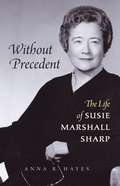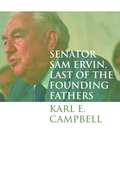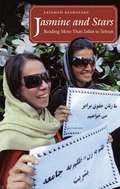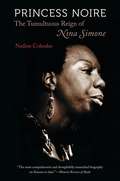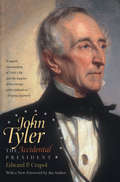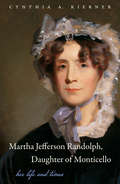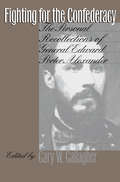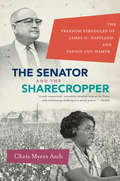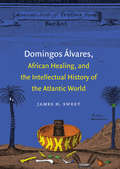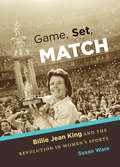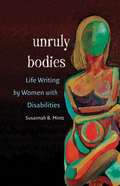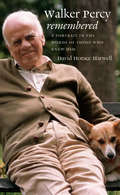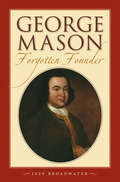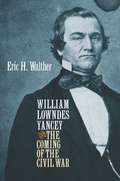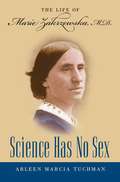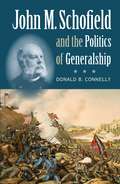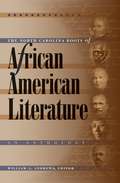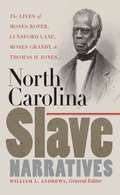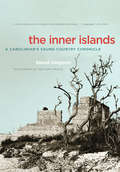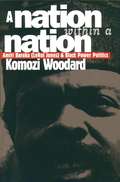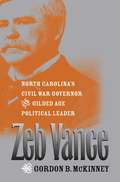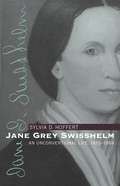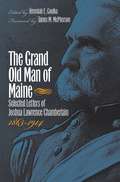- Table View
- List View
Without Precedent
by Anna R. HayesThe first woman judge in the state of North Carolina and the first woman in the United States to be elected chief justice of a state supreme court, Susie Marshall Sharp (1907-1996) broke new ground for women in the legal profession. When she retired in 1979, she left a legacy burnished by her tireless pursuit of lucidity in the law, honesty in judges, and humane conditions in prisons.Anna Hayes presents Sharp's career as an attorney, distinguished judge, and politician within the context of the social mores, the legal profession, and the political battles of her day, illuminated by a careful and revealing examination of Sharp's family background, private life, and personality. Judge Sharp was viewed by contemporaries as the quintessential spinster, who had sacrificed marriage and family life for a successful career. The letters and journals she wrote throughout her life, however, reveal that Sharp led a rich private life in which her love affairs occupied a major place, unsuspected by the public or even her closest friends and family. With unrestricted access to Sharp's abundant journals, papers, and notes, Anna Hayes uncovers the story of a brilliant woman who transcended the limits of her times, who opened the way for women who followed her, and who improved the quality of justice for the citizens of her state. Without Precedent also tells the story of a complicated woman, at once deeply conservative and startlingly modern, whose intriguing self-contradictions reflect the complexity of human nature.
Senator Sam Ervin, Last of the Founding Fathers
by Karl E. CampbellMany Americans remember Senator Sam Ervin (1896-1985) as the affable, Bible-quoting, old country lawyer who chaired the Senate Watergate hearings in 1973. Ervin's stories from down home in North Carolina, his reciting literary passages ranging from Shakespeare to Aesop's fables, and his earnest lectures in defense of civil liberties and constitutional government contributed to the downfall of President Nixon and earned Senator Ervin a reputation as "the last of the founding fathers."Yet for most of his twenty years in the Senate, Ervin applied these same rhetorical devices to a very different purpose. Between 1954 and 1974, he was Jim Crow's most talented legal defender as the South's constitutional expert during the congressional debates on civil rights. The paradox of the senator's opposition to civil rights and defense of civil liberties lies at the heart of this biography of Sam Ervin.Drawing on newly opened archival material, Karl Campbell illuminates the character of the man and the historical forces that shaped him. The senator's distrust of centralized power, Campbell argues, helps explain his ironic reputation as a foe of civil rights and a champion of civil liberties. Campbell demonstrates that the Watergate scandal represented the culmination of an escalating series of clashes between the imperial presidency of Richard Nixon and a congressional counterattack led by Senator Ervin. The issue central to that struggle, as well as to many of the other crusades in Ervin's life, remains a key question of the American experience today--how to exercise legitimate government power while protecting essential individual freedoms.
Unspeakable
by Susan Burch Hannah JoynerJunius Wilson (1908-2001) spent seventy-six years at a state mental hospital in Goldsboro, North Carolina, including six in the criminal ward. He had never been declared insane by a medical professional or found guilty of any criminal charge. But he was deaf and black in the Jim Crow South. Unspeakable is the story of his life.Using legal records, institutional files, and extensive oral history interviews--some conducted in sign language--Susan Burch and Hannah Joyner piece together the story of a deaf man accused in 1925 of attempted rape, found insane at a lunacy hearing, committed to the criminal ward of the State Hospital for the Colored Insane, castrated, forced to labor for the institution, and held at the hospital for more than seven decades. Junius Wilson's life was shaped by some of the major developments of twentieth-century America: Jim Crow segregation, the civil rights movement, deinstitutionalization, the rise of professional social work, and the emergence of the deaf and disability rights movements. In addition to offering a bottom-up history of life in a segregated mental institution, Burch and Joyner's work also enriches the traditional interpretation of Jim Crow by highlighting the complicated intersections of race and disability as well as of community and language. This moving study expands the boundaries of what biography can and should be. There is much to learn and remember about Junius Wilson--and the countless others who have lived unspeakable histories.
Jasmine and Stars
by Fatemeh KeshavarzIn a direct, frank, and intimate exploration of Iranian literature and society, scholar, teacher, and poet Fatemeh Keshavarz challenges popular perceptions of Iran as a society bereft of vitality and joy. Her fresh perspective on present-day Iran provides a rare insight into this rich culture alive with artistic expression but virtually unknown to most Americans. Keshavarz introduces readers to two modern Iranian women writers whose strong and articulate voices belie the stereotypical perception of Iranian women as voiceless victims in a country of villains. She follows with a lively critique of the recent best-seller Reading Lolita in Tehran: A Memoir in Books, which epitomizes what Keshavarz calls the "New Orientalist narrative," a view marred by stereotype and prejudice more often tied to current geopolitical conflicts than to an understanding of Iran. Blending in firsthand glimpses of her own life--from childhood memories in 1960s Shiraz to her present life as a professor in America--Keshavarz paints a portrait of Iran depicting both cultural depth and intellectual complexity. With a scholar's expertise and a poet's hand, she helps amplify the powerful voices of contemporary Iranians and leads readers toward a deeper understanding of the country's past and present.In a direct, frank, and intimate exploration of Iranian literature and society, scholar, teacher, and poet Fatemeh Keshavarz challenges popular perceptions of Iran as a society bereft of vitality and joy. Her fresh perspective on present day Iran provides a rare insight into this rich culture alive with artistic expression but virtually unknown to most Americans. She warns against the rise of what she calls the "New Orientalist narrative," which thrives on stereotype and prejudice and is often tied to current geopolitical conflict rather than an understanding of Iran. Keshavarz offers a lively critique of the best-seller Reading Lolita in Tehran, which she says epitomizes this New Orientalist attitude. Blending in firsthand glimpses of her own life, Keshavarz paints a portrait of Iran depicting both cultural depth and intellectual complexity.-->
Princess Noire
by Nadine CohodasBorn Eunice Waymon in Tryon, North Carolina, Nina Simone (1933-2003) began her musical life playing classical piano. A child prodigy, she wanted a career on the concert stage, but when the Curtis Institute of Music rejected her, the devastating disappointment compelled her to change direction. She turned to popular music and jazz but never abandoned her classical roots or her intense ambition. By the age of twenty six, Simone had sung at New York City's venerable Town Hall and was on her way. Tapping into newly unearthed material on Simone's family and career, Nadine Cohodas paints a luminous portrait of the singer, highlighting her tumultuous life, her innovative compositions, and the prodigious talent that matched her ambition. With precision and empathy, Cohodas weaves the story of Simone's contentious relationship with audiences and critics, her outspoken support for civil rights, her two marriages and her daughter, and, later, the sense of alienation that drove her to live abroad from 1993 until her death. Alongside these threads runs a more troubling one: Simone's increasing outbursts of rage and pain that signaled mental illness and a lifelong struggle to overcome a deep sense of personal injustice.
John Tyler, the Accidental President
by Edward P. CrapolThe first vice president to become president on the death of the incumbent, John Tyler (1790-1862) was derided by critics as "His Accidency." In this biography of the tenth president, Edward P. Crapol challenges depictions of Tyler as a die-hard advocate of states' rights, limited government, and a strict interpretation of the Constitution. Instead, he argues, Tyler manipulated the Constitution to increase the executive power of the presidency. Crapol also highlights Tyler's faith in America's national destiny and his belief that boundless territorial expansion would preserve the Union as a slaveholding republic. When Tyler sided with the Confederacy in 1861, he was branded as America's "traitor" president for having betrayed the republic he once led.
Martha Jefferson Randolph, Daughter of Monticello
by Cynthia A. KiernerAs the oldest and favorite daughter of Thomas Jefferson, Martha "Patsy" Jefferson Randolph (1772-1836) was extremely well educated, traveled in the circles of presidents and aristocrats, and was known on two continents for her particular grace and sincerity. Yet, as mistress of a large household, she was not spared the tedium, frustration, and great sorrow that most women of her time faced. Though Patsy's name is familiar because of her famous father, Cynthia Kierner is the first historian to place Patsy at the center of her own story, taking readers into the largely ignored private spaces of the founding era. Randolph's life story reveals the privileges and limits of celebrity and shows that women were able to venture beyond their domestic roles in surprising ways.Following her mother's death, Patsy lived in Paris with her father and later served as hostess at the President's House and at Monticello. Her marriage to Thomas Mann Randolph, a member of Congress and governor of Virginia, was often troubled. She and her eleven children lived mostly at Monticello, greeting famous guests and debating issues ranging from a woman's place to slavery, religion, and democracy. And later, after her family's financial ruin, Patsy became a fixture in Washington society during Andrew Jackson's presidency. In this extraordinary biography, Kierner offers a unique look at American history from the perspective of this intelligent, tactfully assertive woman.
Fighting for the Confederacy
by Gary W. GallagherOriginally published by UNC Press in 1989, Fighting for the Confederacy is one of the richest personal accounts in all of the vast literature on the Civil War. Alexander was involved in nearly all of the great battles of the East, from First Manassas through Appomattox, and his duties brought him into frequent contact with most of the high command of the Army of Northern Virginia, including Robert E. Lee, Stonewall Jackson, and James Longstreet. No other Civil War veteran of his stature matched Alexander's ability to discuss operations in penetrating detail-- this is especially true of his description of Gettysburg. His narrative is also remarkable for its utterly candid appraisals of leaders on both sides.
The Senator and the Sharecropper: The Freedom Struggles of James O. Eastland and Fannie Lou Hamer
by Chris Myers AschIn this fascinating study of race, politics, and economics in Mississippi, Chris Myers Asch tells the story of two extraordinary personalities--Fannie Lou Hamer and James O. Eastland--who represented deeply opposed sides of the civil rights movement. Both were from Sunflower County: Eastland was a wealthy white planter and one of the most powerful segregationists in the U. S. Senate, while Hamer, a sharecropper who grew up desperately poor just a few miles from the Eastland plantation, rose to become the spiritual leader of the Mississippi freedom struggle. Asch uses Hamer's and Eastland's entwined histories, set against the backdrop of Sunflower County's rise and fall as a center of cotton agriculture, to explore the county's changing social landscape during the mid-twentieth century and its persistence today as a land separate and unequal. Asch, who spent nearly a decade in Mississippi as an educator, offers a fresh look at the South's troubled ties to the cotton industry, the long struggle for civil rights, and unrelenting social and economic injustice through the eyes of two of the era's most important and intriguing figures.
Domingos Álvares, African Healing, and the Intellectual History of the Atlantic World
by James H. SweetBetween 1730 and 1750, Domingos lvares traversed the colonial Atlantic world like few Africans of his time--from Africa to South America to Europe. By tracing the steps of this powerful African healer and vodun priest, James Sweet finds dramatic means for unfolding a history of the eighteenth-century Atlantic world in which healing, religion, kinship, and political subversion were intimately connected. lvares treated many people across the Atlantic, yet healing was rarely a simple matter of remedying illness and disease. Through the language of health and healing, lvares also addressed the profound alienation of warfare, capitalism, and the African slave trade. As a result, he and other African healers frequently ran afoul of imperial power brokers. Nevertheless, even the powerful suffered isolation in the Atlantic world and often turned to African healers for answers. In this way, healers simultaneously became fierce critics of Atlantic imperialism and expert translators of it, adapting their therapeutic strategies in order to secure social relevance and even power. By tracing lvares' frequent uprooting and border crossing, Sweet illuminates how African healing practices evolved in the diaspora, contesting the social and political hierarchies of imperialism while also making profound impacts on the intellectual discourse of the "modern" Atlantic world.
Game, Set, Match: Billie Jean King and the Revolution in Women's Sports
by Susan WareWhen Billie Jean King trounced Bobby Riggs in tennis's "Battle of the Sexes" in 1973, she placed sports squarely at the center of a national debate about gender equity. In this winning combination of biography and history, Susan Ware argues that King's challenge to sexism, the supportive climate of second-wave feminism, and the legislative clout of Title IX sparked a women's sports revolution in the 1970s that fundamentally reshaped American society. While King did not single-handedly cause the revolution in women's sports, she quickly became one of its most enduring symbols, as did Title IX, a federal law that was initially passed in 1972 to attack sex discrimination in educational institutions but had its greatest impact by opening opportunities for women in sports. King's place in tennis history is secure, and now, withGame, Set, Match, she can take her rightful place as a key player in the history of feminism as well. By linking the stories of King and Title IX, Ware explains why women's sports took off in the 1970s and demonstrates how giving women a sporting chance has permanently changed American life on and off the playing field.
Unruly Bodies
by Susannah B. MintzThe first critical study of personal narrative by women with disabilities, Unruly Bodies examines how contemporary writers use life writing to challenge cultural stereotypes about disability, gender, embodiment, and identity. Combining the analyses of disability and feminist theories, Susannah Mintz discusses the work of eight American autobiographers: Nancy Mairs, Lucy Grealy, Georgina Kleege, Connie Panzarino, Eli Clare, Anne Finger, Denise Sherer Jacobson, and May Sarton. Mintz shows that by refusing inspirational rhetoric or triumph-over-adversity narrative patterns, these authors insist on their disabilities as a core--but not diminishing--aspect of identity. They offer candid portrayals of shame and painful medical procedures, struggles for the right to work or to parent, the inventive joys of disabled sex, the support and the hostility of family, and the losses and rewards of aging. Mintz demonstrates how these unconventional stories challenge feminist idealizations of independence and self-control and expand the parameters of what counts as a life worthy of both narration and political activism. Unruly Bodies also suggests that atypical life stories can redefine the relation between embodiment and identity generally.
Walker Percy Remembered
by David Horace HarwellWalker Percy (1916-1990), the reclusive southern author most famous for his 1961 novel The Moviegoer, spent much of his adult life in Covington, Louisiana. In the spirit of traditional southern storytelling, this biography of Percy takes its shape from candid interviews with his family, close friends, and acquaintances. In thirteen interviews, we get to know Percy through his lifelong friend Shelby Foote, Percy's brothers LeRoy and Phin, his former priest, his housekeeper, and former teachers, among others--all in their own words. Over the course of the interviews, readers learn intimate details of Percy's writing process; his interaction with community members of different ethnic, religious, and socioeconomic backgrounds; and his commitment to civil rights issues. What emerges is a multidimensional portrait of Percy as a man, a friend, and a family member.
George Mason, Forgotten Founder
by Jeff BroadwaterGeorge Mason (1725-92) is often omitted from the small circle of founding fathers celebrated today, but in his service to America he was, in the words of Thomas Jefferson, "of the first order of greatness." Jeff Broadwater provides a comprehensive account of Mason's life at the center of the momentous events of eighteenth-century America. Mason played a key role in the Stamp Act Crisis, the American Revolution, and the drafting of Virginia's first state constitution. He is perhaps best known as author of the Virginia Declaration of Rights, a document often hailed as the model for the Bill of Rights.As a Virginia delegate to the Constitutional Convention in Philadelphia, Mason influenced the emerging Constitution on point after point. Yet when he was rebuffed in his efforts to add a bill of rights and concluded the document did too little to protect the interests of the South, he refused to sign the final draft. Broadwater argues that Mason's recalcitrance was not the act of an isolated dissenter; rather, it emerged from the ideology of the American Revolution. Mason's concerns about the abuse of political power, Broadwater shows, went to the essence of the American experience.
William Lowndes Yancey and the Coming of the Civil War
by Eric H. WaltherIWilliam Lowndes Yancey (1814-63) was one of the leading secessionists of the Old South. In this first comprehensive biography, Eric H. Walther examines the personality and political life of the uncompromising fire-eater.Born in Georgia but raised in the North by a fiercely abolitionist stepfather and an emotionally unstable mother, Yancey grew up believing that abolitionists were cruel, meddling, and hypocritical. His personal journey led him through a series of mentors who transformed his political views, and upon moving to frontier Alabama in his twenties, Yancey's penchant for rhetorical and physical violence was soon channeled into a crusade to protect slaveholders' rights.Yancey defied Northern Democrats at their national nominating convention in 1860, rending the party and setting the stage for secession after the election of Abraham Lincoln. Selected to introduce Jefferson Davis in Montgomery as the president-elect of the Confederacy, Yancey also served the Confederacy as a diplomat and a senator before his death in 1863, just short of his forty-ninth birthday.More than a portrait of an influential political figure before and during the Civil War, this study also presents a nuanced look at the roots of Southern honor, violence, and understandings of manhood as they developed in the nineteenth century.
Science Has No Sex
by Arleen Marcia TuchmanGerman-born Marie Zakrzewska (1829-1902) was one of the most prominent female physicians of nineteenth-century America. Best known for creating a modern hospital and medical education program for women, Zakrzewska battled against the gendering of science and the restrictive definitions of her sex. In Science Has No Sex, Arleen Tuchman examines the life and work of a woman who continues to challenge historians of gender to this day. At a time when most women physicians laid claim to "female" qualities of care and nurturance to justify their professional choice, Zakrzewska insisted that all physicians, regardless of gender, should depend upon the rational faculties developed through training in the natural sciences. She viewed science as a democratizing tool--anyone could master science, she asserted, and therefore the doors to the elite profession of medicine should be opened to all.Shedding light on the changes that radically transformed medicine in the late nineteenth century, Tuchman's analysis also demonstrates how Zakrzewska's activism is important to the ongoing debate over the relationship between science and sex.
John M. Schofield and the Politics of Generalship
by Donald B. ConnellyIn the first full biography of Lieutenant General John McAllister Schofield (1831-1906), Donald B. Connelly examines the career of one of the leading commanders in the western theater during the Civil War. In doing so, Connelly illuminates the role of politics in the formulation of military policy, during both war and peace, in the latter half of the nineteenth century.Connelly relates how Schofield, as a department commander during the war, had to cope with contending political factions that sought to shape military and civil policies. Following the war, Schofield occupied every senior position in the army--including secretary of war and commanding general of the army--and became a leading champion of army reform and professionalism. He was the first senior officer to recognize that professionalism would come not from the separation of politics and the military but from the army's accommodation of politics and the often contentious American constitutional system. Seen through the lens of Schofield's extensive military career, the history of American civil-military relations has seldom involved conflict between the military and civil authority, Connelly argues. The central question has never been whether to have civilian control but rather which civilians have a say in the formulation and execution of policy.
The North Carolina Roots of African American Literature
by William L. AndrewsThe first African American to publish a book in the South, the author of the first female slave narrative in the United States, the father of black nationalism in America--these and other founders of African American literature have a surprising connection to one another: they all hailed from the state of North Carolina.This collection of poetry, fiction, autobiography, and essays showcases some of the best work of eight influential African American writers from North Carolina during the nineteenth and early twentieth centuries. In his introduction, William L. Andrews explores the reasons why black North Carolinians made such a disproportionate contribution (in quantity and lasting quality) to African American literature as compared to that of other southern states with larger African American populations. The authors in this anthology parlayed both the advantages and disadvantages of their North Carolina beginnings into sophisticated perspectives on the best and the worst of which humanity, in both the South and the North, was capable. They created an African American literary tradition unrivaled by that of any other state in the South. Writers included here are Charles W. Chesnutt, Anna Julia Cooper, David Bryant Fulton, George Moses Horton, Harriet Jacobs, Lunsford Lane, Moses Roper, and David Walker.
North Carolina Slave Narratives
by William L. AndrewsThe autobiographies of former slaves contributed powerfully to the abolitionist movement in the United States, fanning national--even international--indignation against the evils of slavery. The four texts gathered here are all from North Carolina slaves and are among the most memorable and influential slave narratives published in the nineteenth century. The writings of Moses Roper (1838), Lunsford Lane (1842), Moses Grandy (1843), and the Reverend Thomas H. Jones (1854) provide a moving testament to the struggles of enslaved people to affirm their human dignity and ultimately seize their liberty.Introductions to each narrative provide biographical and historical information as well as explanatory notes. Andrews's general introduction to the collection reveals that these narratives not only helped energize the abolitionist movement but also laid the groundwork for an African American literary tradition that inspired such novelists as Toni Morrison and Charles Johnson.The autobiographies of former slaves contributed powerfully to the abolitionist movement in the United States, fanning national--and international--indignation against the evils of slavery. The four texts gathered here are all from North Carolina slaves and are among the most memorable and influential slave narratives published in the nineteenth century. The writings of Moses Roper (1838), Lunsford Lane (1842), Moses Grandy (1843), and the Reverend Thomas H. Jones (1854) provide a moving testament to the struggles of enslaved people to affirm their human dignity and ultimately seize their liberty. Introductions to each narrative provide biographical and historical information as well as explanatory notes.-->
The Inner Islands
by Bland Simpson Ann Cary SimpsonBlending history, oral history, autobiography, and travel narrative, Bland Simpson explores the islands that lie in the sounds, rivers, and swamps of North Carolina's inner coast. In each of the fifteen chapters in the book, Simpson covers a single island or group of islands, many of which, were it not for the buffering Outer Banks, would be lost to the ebbs and flows of the Atlantic. Instead they are home to unique plant and animal species and well-established hardwood forests, and many retain vestiges of an earlier human history.
A Nation within a Nation
by Komozi WoodardPoet and playwright Amiri Baraka is best known as one of the African American writers who helped ignite the Black Arts Movement. This book examines Baraka's cultural approach to Black Power politics and explores his role in the phenomenal spread of black nationalism in the urban centers of late-twentieth-century America, including his part in the election of black public officials, his leadership in the Modern Black Convention Movement, and his work in housing and community development.Komozi Woodard traces Baraka's transformation from poet to political activist, as the rise of the Black Arts Movement pulled him from political obscurity in the Beat circles of Greenwich Village, swept him into the center of the Black Power Movement, and ultimately propelled him into the ranks of black national political leadership. Moving outward from Baraka's personal story, Woodard illuminates the dynamics and remarkable rise of black cultural nationalism with an eye toward the movement's broader context, including the impact of black migrations on urban ethos, the importance of increasing population concentrations of African Americans in the cities, and the effect of the 1965 Voting Rights Act on the nature of black political mobilization.
Beyond Love and Loyalty: The Letters of Thomas Wolfe and Elizabeth Nowell, Together with 'no More Rivers,' a Story By Thomas Wolfe
by Thomas WolfeLetters--mostly of the nuts-and-bolts, practical variety--between Thomas Wolfe and his literary agent, Elizabeth Nowell. Nowell served as Wolfe's editor for many of his short stories, paring them down to make them acceptable to magazines. Oddly enough, his attitude toward her was grateful rather than adversarial, and their deep mutual respect is clearly evident in these letters.Originally published in 1983. A UNC Press Enduring Edition -- UNC Press Enduring Editions use the latest in digital technology to make available again books from our distinguished backlist that were previously out of print. These editions are published unaltered from the original, and are presented in affordable paperback formats, bringing readers both historical and cultural value.
Zeb Vance
by Gordon B. MckinneyIn this comprehensive biography of the man who led North Carolina through the Civil War and, as a U.S. senator from 1878 to 1894, served as the state's leading spokesman, Gordon McKinney presents Zebulon Baird Vance (1830-94) as a far more complex figure than has been previously recognized. Vance campaigned to keep North Carolina in the Union, but after Southern troops fired on Fort Sumter, he joined the army and rose to the rank of colonel. He was viewed as a champion of individual rights and enjoyed great popularity among voters. But McKinney demonstrates that Vance was not as progressive as earlier biographers suggest. Vance was a tireless advocate for white North Carolinians in the Reconstruction Period, and his policies and positions often favored the rich and powerful.McKinney provides significant new information about Vance's third governorship, his senatorial career, and his role in the origins of the modern Democratic Party in North Carolina. This new biography offers the fullest, most complete understanding yet of a legendary North Carolina leader.
Jane Grey Swisshelm: An Unconventional Life, 1815-1884
by Sylvia D. HoffertNineteenth-century newspaper editor Jane Grey Swisshelm (1815-1884) was an unconventionally ambitious woman. While she struggled in private to be a dutiful daughter, wife, and mother, she publicly critiqued and successfully challenged gender conventions that restricted her personal behavior, limited her political and economic opportunities, and attempted to silence her voice. As the owner and editor of newspapers in Pittsburgh; St. Cloud, Minnesota; and Washington, D.C.; and as one of the founders of the Minnesota Republican Party, Swisshelm negotiated a significant place for herself in the male-dominated world of commerce, journalism, and politics. How she accomplished this feat; what expressive devices she used; what social, economic, and political tensions resulted from her efforts; and how those tensions were resolved are the central questions examined in this biography. Sylvia Hoffert arranges the book topically, rather than chronologically, to include Swisshelm in the broader issues of the day, such as women's involvement in politics and religion, their role in the workplace, and marriage. Rescuing this prominent feminist from obscurity, Hoffert shows how Swisshelm laid the groundwork for the "New Woman" of the turn of the century.
The Grand Old Man of Maine
by Jeremiah E. GoulkaBest known as the hero of Little Round Top at Gettysburg and the commanding officer of the troops who accepted the Confederates' surrender at Appomattox, Joshua Lawrence Chamberlain (1828-1914) has become one of the most famous and most studied figures of Civil War history. After the war, he went on to serve as governor of Maine and president of Bowdoin College. The first collection of his postwar letters, this book offers important insights for understanding Chamberlain's later years and his place in chronicling the war.The letters included here reveal Chamberlain's perspective on military events at Gettysburg, Five Forks, and Appomattox, and on the planning of ceremonies to celebrate the fiftieth anniversary of Gettysburg. As Jeremiah Goulka points out in his introduction, the letters also shed light on Chamberlain's views on politics, race relations, and education, and they expose some of the personal difficulties he faced late in life. On a broader scale, Chamberlain's correspondence contributes to a better understanding of the influence of Civil War veterans on American life and the impact of the war on veterans themselves. It also says much about state and national politics (including the politics of pensions), family roles and relationships, and ideas of masculinity in Victorian America.
